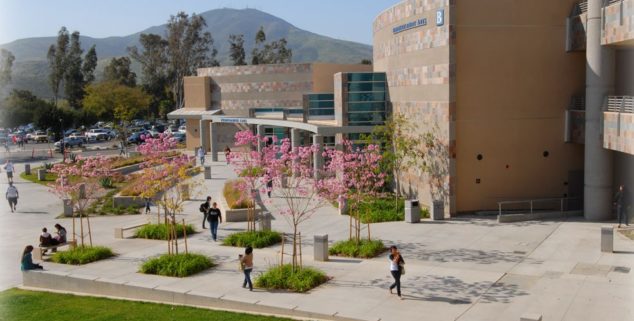Opinion
Cuyamaca College’s admissions policy offers statewide model
 On the campus of Cuyamaca Community College. (College photo)
On the campus of Cuyamaca Community College. (College photo)At Cuyamaca College, graduation is right around the corner. This is a time of great joy for students and their families. It’s also a time of reflection for me about how we can help more students reach this critical life milestone and obtain a college degree.
This year I find myself thinking about students like Karly Franz. Karly returned to college looking for a career change. After working for several years as a historical costumer, Karly wants to be a high school biology teacher. That means she will have to pass Calculus. For someone who hadn’t taken math in five years, this was daunting, and Karly’s score on the placement test put her into remedial math, which meant a delay in her plans to transfer to Cal State, a delay in starting her new career, and a delay in much needed wages.
Cuyamaca College no longer relies on a standardized test to place students in math classes. Instead, placement is determined by a student’s test score OR high school grades, whichever is higher.
Karly’s experience speaks to one of the most significant barriers for students at California’s community colleges. Every year, students around the state begin their college journey, only to be told after taking a standardized placement test that they must take remedial courses that will not count toward transfer at the CSU or UC. Just 34% of California community college students placed into math remediation complete math requirements for transfer or a degree within six years. And if you don’t successfully complete math requirements, you don’t earn a degree and you don’t transfer.
Luckily, Karly’s chances are much better due to a pioneering new approach to how we assess students’ readiness for college. For Karly, Cuyamaca College took into account not just her standardized test score but also her high school grades, which were strong enough to bypass remediation and take transfer-level Pre-Calculus, along with a support course to help her with algebra skills. Karly earned a B+ in Pre-Calculus and she is now well on her way to becoming a high school biology teacher.
Cuyamaca College no longer relies on a standardized test to place students in math classes. Instead, placement is determined by a student’s test score OR high school grades, whichever is higher. We have also changed how we support under-prepared students. In math, instead of delaying their progress with remedial classes that don’t carry college credit, we allow students to enroll directly in transferable college courses that have additional units attached, where their instructor provides just-in-time review to help them succeed.
Cuyamaca is one of several community colleges in California that is piloting this innovative approach. Our results show what is possible when colleges transform placement and remediation. Before we made these changes, just 10 percent of students placed in remedial math completed a transfer-level math course in a year. Now 66 percent of students completed a transfer math class in their first semester – nearly seven times higher, in half the time.
Under our previous policies, African American and Latino students were far less likely to place into transfer-level math. Under the new policies, African American students’ access to transfer-level math increased eight-fold, Latino students’ access increased four-fold, and the disproportionate impact in placement was eliminated for all racial groups.
The changes we made were not expensive. We simply asked students to report their high school grades when they took the assessment test. Research shows that students’ answers are reliable, and our results prove that this approach produces dramatic improvements in math completion.
Legislators in Sacramento are currently considering AB 705, a bill that will take many of the approaches we’ve piloted at Cuyamaca College statewide. The legislation requires colleges to use students’ high school grades to make placement decisions instead of relying on discredited standardized tests. Our experience makes clear that this policy will allow more students to bypass remediation, increase math completion, and reduce racial achievement gaps.
The bill is currently before the Appropriations Committee, chaired by San Diego Assemblywoman Lorena Gonzalez-Fletcher. I was surprised to see a recent cost assessment of the bill for a statewide transcript-sharing system. While there are merits to creating such a system, colleges can meet the requirements of AB 705 whether or not one exists.
We need to ensure that all California community college students have access to the reforms included in AB 705. Students’ chances of completing college should not depend on living within driving range of Cuyamaca College.
—
Ed’s Note: Dr. Julianna M. Barnes is president of Cuyamaca College.
Want to see more stories like this? Sign up for The Roundup, the free daily newsletter about California politics from the editors of Capitol Weekly. Stay up to date on the news you need to know.
Sign up below, then look for a confirmation email in your inbox.

Leave a Reply